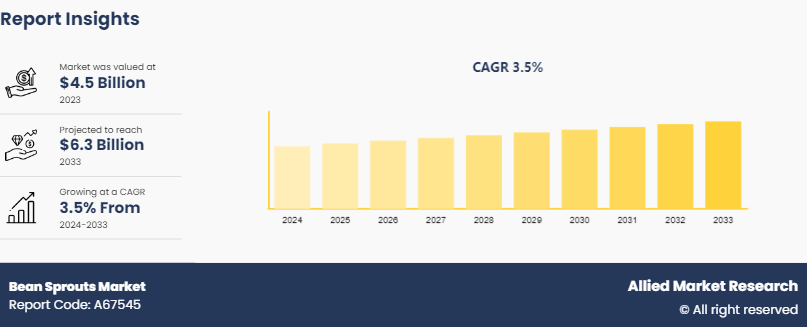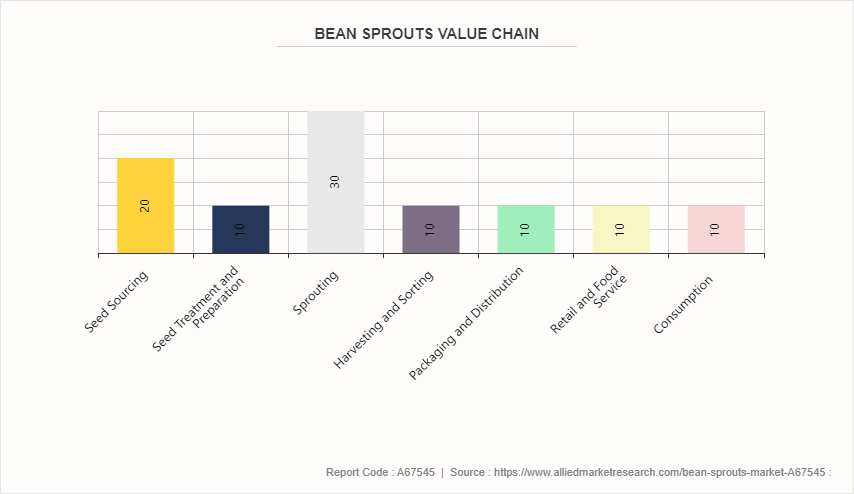Bean Sprouts Market Research, 2033
The global bean sprouts market size was valued at $4.5 billion in 2023, and is projected to reach $6.3 Billion by 2033, growing at a CAGR of 3.5% from 2024 to 2033.
Bean sprouts are young, tender shoots that emerge from germinated beans, typically mung beans or soybeans. These sprouts are commonly used in various cuisines, especially in Asian cooking, for their crunchy texture, mild flavor, and nutritional benefits. Bean sprouts are produced by soaking beans in water until they sprout, after which the beans are cultivated in a warm, humid setting for several days. During this time, they develop thin, pale stems with tiny, undeveloped leaves. Bean sprouts are rich in vitamins, minerals, and enzymes, which makes them a healthy addition to salads, stir-fries, soups, and sandwiches. These sprouts add a refreshing crunch and subtle sweetness to dishes while providing essential nutrients such as vitamin C, vitamin K, folate, and fiber. However, it is essential to handle bean sprouts safely to prevent the risk of foodborne illnesses.

Key Takeaways
The bean sprouts market study covers 20 countries. The research includes a segment analysis of each country in terms of value for the projected period.
More than 1, 500 product literatures, industry releases, annual reports, and other such documents of major energy storage system industry participants along with authentic industry journals, trade associations' releases, and government websites have been reviewed for generating high-value industry insights.
The study integrated high-quality data, professional opinions and analysis, and critical independent perspectives. The research approach is intended to provide a balanced view of global markets and to assist stakeholders in making educated decisions in order to achieve their most ambitious growth objectives.
Key Market Dynamics
The rise in popularity of plant-based diets has significantly surged the bean sprouts market demand for bean sprouts. Bean sprouts are a staple in vegetarian and vegan diets, offering a rich source of plant-based protein, fiber, vitamins, and minerals. As more individuals adopt plant-based lifestyles for health, environmental, and ethical reasons, the demand for versatile and nutritious plant-based ingredients such as bean sprouts has increased simultaneously. In addition, bean sprouts are widely used in Asian cuisine, which has gained widespread popularity globally, further driving bean sprouts market size. Bean sprouts serve as a crunchy and flavorful addition to a variety of dishes such as stir-fries, salads, soups, and wraps, which appeals to both vegetarians and other individuals. Furthermore, the growth in awareness of the health benefits associated with consuming whole food and plant-based ingredients has led to increased interest in bean sprouts as a nutritious and low-calorie option. The bean sprouts industry is expected to experience a surge in demand as the plant-based food trend continues to grow worldwide in the coming years.
However, concerns related to food safety and hygiene in bean sprout production restrain the market demand for bean sprouts. Instances of foodborne illnesses linked to contaminated sprouts can lead to a loss of consumer trust and confidence in the product, resulting in reduced sales. In addition, stringent regulations and guidelines governing the production and handling of sprouts impose compliance costs on producers, potentially increasing the final retail price of bean sprouts and making them less competitive compared to other food options. Moreover, the perishable nature of fresh bean sprouts requires strict adherence to proper storage and handling practices throughout the supply chain to prevent spoilage and maintain quality, further adding to production costs and logistical challenges. Thus, concerns about food safety and hygiene are anticipated to pose operational challenges for producers, thereby restraining the overall bean sprouts market share.
Moreover, investment in research and development for extending shelf life and enhancing quality has created bean sprouts market opportunities. By developing innovative preservation techniques and packaging solutions, producers can extend the shelf life of bean sprouts, reducing wastage and enabling wider distribution to new markets. Enhanced quality through improved cultivation practices, such as optimizing growing conditions and selecting superior bean varieties, can result in sprouts with better taste, texture, and nutritional content, thus meeting the preferences of consumers seeking premium products. Furthermore, technological advancements in post-harvest handling and processing allow for the development of convenient and ready-to-eat bean sprout products, catering to busy lifestyles and expanding usage occasions beyond traditional culinary applications. As a result, such investments drive product differentiation, market growth, and consumer satisfaction, positioning bean sprouts as a competitive and sought-after ingredient in the global food industry during the bean sprouts market forecast.
Value Chain of Global Bean Sprouts Market
The bean sprouts market value chain starts with sourcing high-quality seeds, which are treated and prepared for sprouting. The seeds are then placed in controlled environments to facilitate germination, typically taking a few days. Once the sprouts reach the desired length, they are harvested, sorted to remove any defects, and packaged for distribution. The packaged sprouts are then transported to wholesalers, retailers, or food service establishments, where they are made available for purchase by consumers. Consumers further buy bean sprouts to incorporate into various dishes or consume them fresh as a nutritious snack. In addition, supporting activities such as transportation, storage, quality control, and marketing efforts ensure the freshness, safety, and availability of bean sprouts throughout the value chain.

Market Segmentation
The bean sprouts market share is segmented into type, source, application, distribution channel, and region. On the basis of type, the market is divided into mung bean sprouts, soybean sprouts, alfalfa sprouts, radish sprouts, and others. As per source, the market is bifurcated into conventional and organic. On the basis of application, the market is categorized into food service industry, household consumers, and food processing industry. On the basis of distribution channel, the bean sprouts market is segregated into supermarkets/hypermarkets, convenience stores, specialty stores, online sales channel, and others. Region wise, the market is analyzed across North America, Europe, Asia-Pacific, and LAMEA.
Regional/Country Market Outlook
The plant-based food consumption in the U.S. has surged, with sales reaching $8.0 billion in 2022, which reflects a 6.6% growth. According to the Plant Based Foods Association (PBFA) , 70.0% of all U.S. citizens consume plant-based food, a rise from 66.0% in 2022. In the same year, these food were consumed by 60.0% of households, with an 80.0% repeat purchase rate across all categories. The increase in trend of plant-based food choices is to drive the growth of the U.S. bean sprouts market, as bean sprouts are a popular choice in plant-based diets, benefiting from the increasing demand and consumer preference for plant-derived alternatives.
Bean Sprouts Industry Trends:
The rise of organic and locally sourced products is set to significantly boost the sales of the bean sprouts market. According to the 2023 Organic Industry Survey released by the Organic Trade Association, organic food sales in the U.S. crossed $60.0 billion in 2022, demonstrating the resilience of the organic sector. The survey also revealed that total organic sales, including non-food organic products, reached a record $67.6 billion, highlighting the continued growth and strength of the organic market. With a growing number of consumers prioritizing products that align with their values, including those grown without synthetic pesticides or fertilizers and sourced from nearby farms, there is an increased demand for organic and locally sourced bean sprouts. As a result, producers aiming to offer organic bean sprouts cultivated using sustainable farming practices and sourced locally are likely to experience increased sales as they cater to the preferences and concerns of consumers during the beans sprout market analysis.
Local and regional production of organic bean sprouts has seen a surge, with numerous small-scale and regional organic farmers cultivating and distributing these sprouts to cater to local demand, especially in regions with significant populations of health-conscious consumers. The trend is expected to boost the bean sprouts market growth by providing consumers with access to fresher, locally sourced products, thereby enhancing their appeal and perceived quality. In addition, supporting local and regional farmers contributes to the sustainability of agricultural practices, promotes community engagement, and stimulates economic growth in these areas, further fueling market expansion.
Competitive Landscape
The major players operating in the bean sprouts market include Henan Lvsezhongyuan, Zhengzhou New Village, Ningbo Wulongtan, Anhui Anxin, Fuji Natural Foods, Narita Foods, Pulmuone, Daesang, and Jonathan Sprouts.
Other players in bean sprouts market includes Shanghai Yuanye Bio-Tech Co., Ltd., Nature's Sensation, Sungro Sprouts, Jonathan Sprouts, Evergreen Fresh Sprouts, Bangkok Ranch Public Company Limited, Shree Sai Sprouts, Dong-A Sprout Co., Ltd., Golden Value Sprouts, and so on.
Recent Key Strategies and Developments
In November 2021, Van der Plas Sprouts partnered with a Spanish company called GreenFarm, which specializes in the production and distribution of organic fruit and vegetables to expand product offerings and distribution channels of Van der Plas Sprouts.
In August 2021, Sprouts Farmers Market Inc. acquired Mighty Meals, an online organic grocery delivery company to enhance e-commerce capabilities and provide customers with increased convenience in the bean sprouts market.
In March 2021, Jonathan Sprouts launched Sprouty Snacks to increase the product portfolio of roasted and seasoned sprouted beans and lentils.
Key Sources Referred
Food Safety and Standards Authority of India (FSSAI)
U.S. Food and Drug Administration (FDA)
Organic Trade Association (OTA)
Euromonitor International
Plant Based Foods Association
Food and Agriculture Organization of the United Nations (FAO)
National Restaurant Association (NRA)
Agricultural & Processed Food Products Export Development Authority (APEDA)
U.S. Department of Agriculture (USDA)
Bureau of Labor Statistics (BLS)
Key Benefits For Stakeholders
- This report provides a quantitative analysis of the market segments, current trends, estimations, and dynamics of the bean sprouts market analysis to identify the prevailing market opportunities.
- The market research is offered along with information related to key drivers, restraints, and opportunities.
- Porter's five forces analysis highlights the potency of buyers and suppliers to enable stakeholders make profit-oriented business decisions and strengthen their supplier-buyer network.
- In-depth analysis of the bean sprouts market segmentation assists to determine the prevailing market opportunities.
- Major countries in each region are mapped according to their revenue contribution to the global market.
- Market player positioning facilitates benchmarking and provides a clear understanding of the present position of the market players.
- The report includes the analysis of the regional as well as global bean sprouts market trends, key players, market segments, application areas, and bean sprouts market growth strategies.
Bean Sprouts Market Report Highlights
| Aspects | Details |
| Market Size By 2033 | USD 6.3 Billion |
| Growth Rate | CAGR of 3.5% |
| Forecast period | 2024 - 2033 |
| Report Pages | 289 |
| By Type |
|
| By Source |
|
| By Application |
|
| By Distribution Channel |
|
| By Region |
|
| Key Market Players | Daesang, Zhengzhou New Village, Henan Lvsezhongyuan, Fuji Natural Foods, Anhui Anxin, Pulmuone, Narita Foods, Jonathan Sprouts, Ningbo Wulongtan |
The global bean sprouts market trends include increased demand for organic and non-GMO products, innovative packaging solutions, rising popularity in plant-based diets, and expansion in Asian cuisine markets.
The leading application of the bean sprouts market is in the food and beverage industry, particularly in salads, sandwiches, soups, and stir-fries, where they are valued for their nutritional benefits and crunchy texture.
Asia-Pacific held the highest market share in terms of revenue in 2023.
The global bean sprouts market was valued at $4.5 billion in 2023, and is projected to reach $6.3 Billion by 2033, growing at a CAGR of 3.5% from 2024 to 2033.
The major players operating in the bean sprouts market include Henan Lvsezhongyuan, Zhengzhou New Village, Ningbo Wulongtan, Anhui Anxin, Fuji Natural Foods, Narita Foods, Pulmuone, Daesang, and Jonathan Sprouts.
Loading Table Of Content...



